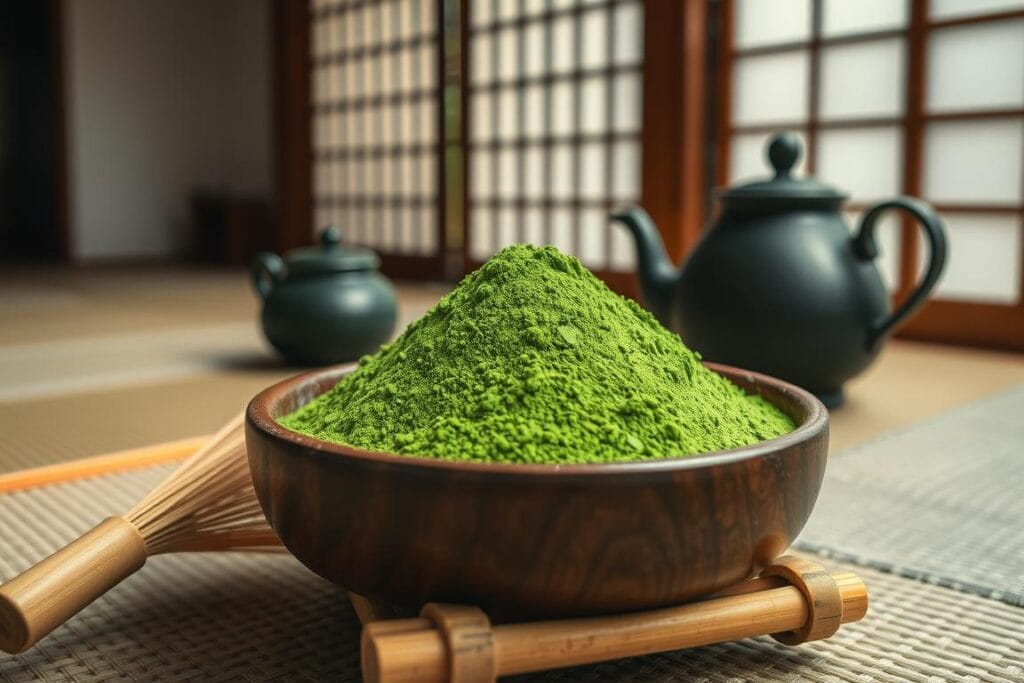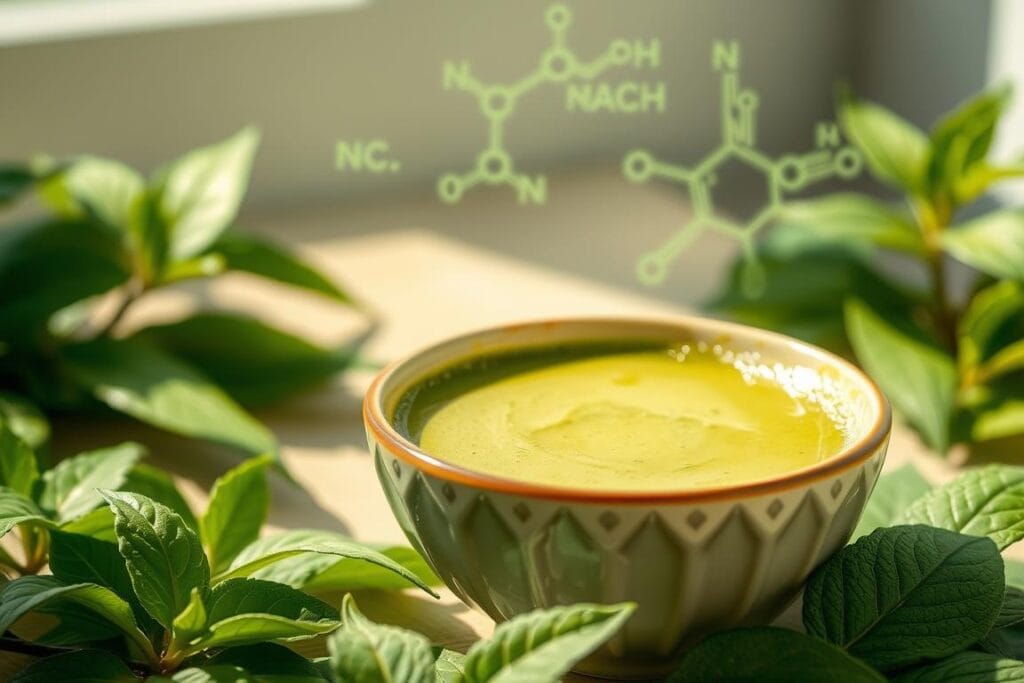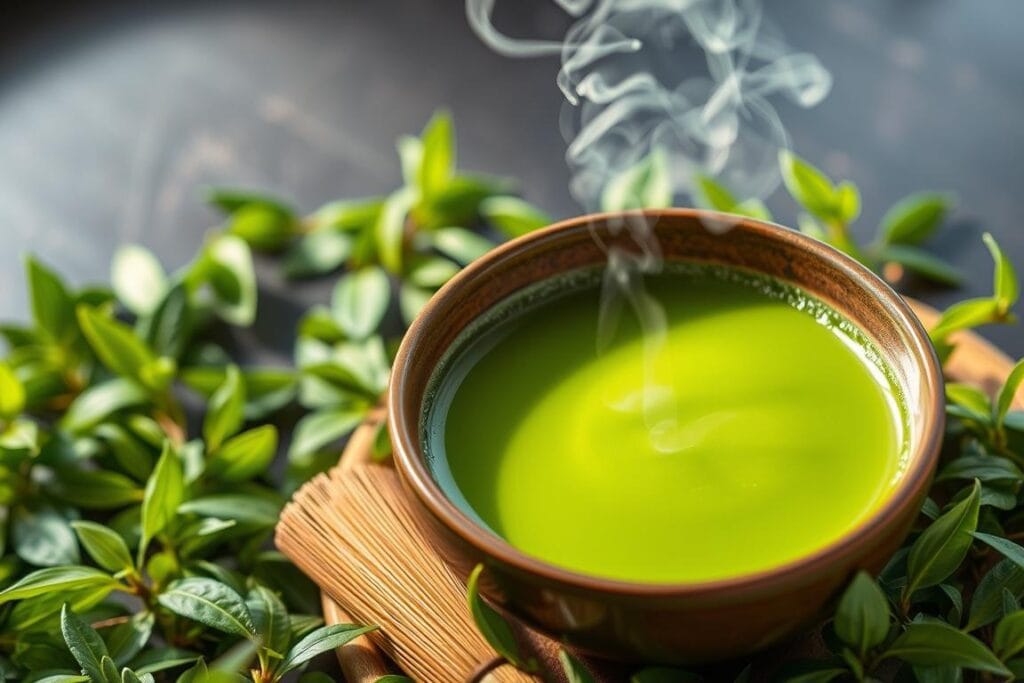Key Takeaways
- Matcha contains 40-180mg of caffeine per typical serving
- Provides longer-lasting alertness compared to coffee
- Offers a smooth, jitter-free energy experience
- Can be consumed as a drink or in green tea powder desserts
- Supports sustained mental clarity
Understanding Matcha: What Sets It Apart from Regular Green Tea
Explore the world of matcha, a special Japanese treasure. It turns regular green tea into a unique culinary adventure. Matcha has a rich cultural background and a special way of being made, making it more than just a drink.
For a delightful recipe that highlights matcha’s potential, explore this guide on Matcha Brownies from Alex’s Recipes.

Traditional Japanese Origins and Processing
Matcha has been a part of Japan for centuries, deeply rooted in tea ceremonies. It starts on tea farms where tradition and precision meet. Making matcha is an art that sets it apart from regular green tea.
- Grown exclusively in specific regions of Japan
- Harvested by skilled tea farmers
- Processed with meticulous attention to detail
The Unique Shading Process
Matcha’s special shading technique makes it stand out. Tea plants are covered with bamboo mats before harvest. This process boosts amino acids and gives matcha a rich, complex taste.
“The art of matcha is not just in its taste, but in its careful cultivation” – Japanese Tea Master
Whole Leaf Powder vs. Traditional Tea
Unlike traditional tea, matcha is made by grinding whole leaves into powder. This means you get all the nutrients and flavor in every sip.
| Characteristic | Matcha | Traditional Green Tea |
|---|---|---|
| Nutrient Absorption | 100% (Whole Leaf) | Limited |
| Flavor Intensity | High | Mild |
| Preparation Method | Whisked Powder | Steeped Leaves |
For those into Japanese sweets, matcha brings unmatched flavor and nutrition. It turns simple treats into amazing culinary experiences.
The Science Behind Matcha’s Caffeine Content

Exploring vegan matcha sweets reveals a unique science behind caffeine release. Matcha’s caffeine works differently than regular drinks, giving a refined energy boost.
Matcha’s magic comes from its special growing process. Tea plants are shaded, which starts amazing chemical changes. This boosts caffeine and nutrient levels, making it a top choice for superfood brownies.
- Shading increases chlorophyll production
- Amino acid levels rise during this process
- Unique molecular bonding occurs with caffeine
Matcha’s caffeine bonds with bigger catechin compounds, creating a new way to release energy. Unlike coffee’s sudden spike, matcha gives a steady energy lift that lasts 6-8 hours.
“Matcha transforms caffeine consumption into an art of balanced energy.” – Nutritional Science Research
| Matcha Characteristic | Energy Impact |
|---|---|
| Caffeine Binding | Slow, Sustained Release |
| L-Theanine Interaction | Calm, Alert State |
| Biochemical Complexity | Balanced Energy Delivery |
Learning about matcha’s complex caffeine science changes how you feel energy. It shifts from a quick rush to a calm, steady alertness.
Matcha vs. Coffee: Comparing Caffeine Levels
Looking into energy-boosting drinks, matcha and coffee show interesting differences. Your choice of morning drink can really affect your energy and health.
Discover more tips about matcha and wellness with Healthy Eating Habits Tips from Alex’s Recipes.
Average Caffeine Content per Serving
Matcha has a special caffeine mix compared to coffee. Coffee usually has 95 mg of caffeine per cup. But, matcha gives you 40-180 mg, depending on its quality and how you make it.
| Beverage | Caffeine Content (mg) | Energy Characteristics |
|---|---|---|
| Coffee | 95 | Quick, intense burst |
| Matcha | 40-180 | Sustained, smooth release |
Duration of Energy Effects
The energy boost from coffee and matcha is quite different. Coffee gives you a 3-4 hour energy boost but can lead to a crash. Matcha, with its unique flavors, offers a steady energy boost for 6-8 hours.
Impact on Body and Mind
Matcha is special because of its L-theanine, which helps your mind stay clear and calm. It makes your body use caffeine more evenly, giving you a smoother energy boost.
- Promotes sustained mental focus
- Reduces caffeine-related anxiety
- Provides balanced energy release
The L-Theanine Factor: Matcha’s Secret Weapon
Matcha gives you a unique energy boost that’s different from other caffeinated drinks. This is thanks to L-theanine, a special amino acid. It turns your matcha into a drink that’s great for your health.
Drinking matcha is more than just getting caffeine. The way matcha is grown increases L-theanine levels. This creates a mix of calm alertness. L-theanine balances out caffeine’s effects, giving you a steady energy flow.
“L-theanine is the secret ingredient that makes matcha a true superfood for mental clarity and focus.”
- Promotes relaxation without drowsiness
- Enhances mental clarity
- Balances caffeine’s stimulating effects
- Supports improved sleep quality
Matcha also has antioxidants that add to L-theanine’s benefits. Your body gets a mix of nutrition and gentle energy. This is better than what you get from regular coffee or tea.
| Matcha Characteristic | L-Theanine Impact |
|---|---|
| Caffeine Content | 70mg per teaspoon |
| Energy Duration | Approximately 4 hours |
| Mental Clarity | Significantly Enhanced |
Choosing matcha means more than picking a drink. It’s a choice for a holistic approach to energy and wellness. It cares for both your body and mind.
How Matcha Affects Your Body’s Energy Levels
Discover the secret to a lasting caffeine boost with matcha. Unlike traditional energy drinks, matcha gives you a smooth, balanced energy. This keeps you alert without the big drops in energy.
The Sustained Energy Release Mechanism
Matcha offers a remarkable energy boost. Its caffeine works with catechins for a slow energy release that lasts 6-8 hours. This is different from other stimulants:
- Smooth energy without sudden spikes
- Stable metabolic effects throughout the day
- Reduced risk of energy crashes
Avoiding the Coffee Crash
Your body processes matcha differently than coffee. The mix of caffeine and L-theanine stops the usual energy highs and lows. This means you get:
- Sustained mental clarity
- Balanced energy levels
- Reduced caffeine tolerance development
“Matcha doesn’t just give you energy – it gives you balanced, intelligent energy.” – Wellness Expert
By choosing matcha, you’re picking a smarter way to manage your daily energy. It supports your body’s natural rhythms.
Making Delicious Matcha Brownies: A Perfect Energy-Boosting Treat
Looking for a tasty green tea dessert that boosts your energy? Matcha brownies are the perfect choice! They mix the deep taste of chocolate with the special flavor of matcha powder.
To make the best matcha brownies, you need to pick the right ingredients and follow a few steps. Here’s a simple guide to making these tasty green treats:
- Use high-quality culinary-grade matcha powder
- Balance dry and wet ingredients precisely
- Bake at 350°F for 20-25 minutes
- Watch for the perfect fudgy texture
Matcha brownies are special because of their nutritional benefits. Unlike regular brownies, they give you lasting energy. This is thanks to matcha’s mix of caffeine and L-theanine.
“Matcha brownies aren’t just a dessert – they’re an experience that awakens your senses and energizes your body.”
Try new things to keep your matcha brownies exciting:
- Chocolate matcha swirl brownies
- Nutty matcha brownies with almonds
- Vegan matcha brownie options
- Gluten-free matcha brownie recipes
Pro tip: Sprinkle extra matcha powder on your brownies for a great photo. Enjoy them with whipped cream or vanilla ice cream for a special treat.
Check out this article on Sweet Potato and Bacon Casserole to find another exciting recipe that combines flavor with nutrition.
Best Practices for Matcha Consumption
Learning how to prepare and drink matcha is key to getting the most out of it. It’s important to know how to make it and how much to drink each day. This way, you can enjoy its benefits while keeping your caffeine intake in check.
Understanding Optimal Serving Sizes
Getting the right amount of matcha is important. A typical serving is 1-2 grams, which has about 40-80 mg of caffeine. This amount gives you a good mix of taste and energy without too much caffeine.
- Recommended serving: 1-2 grams per cup
- Caffeine content: 40-80 mg per serving
- Maximum daily intake: 2-3 servings
Daily Intake Recommendations
Your body’s sensitivity to caffeine should help you decide how much matcha to drink. Most people can safely have 2-3 servings a day. Just pay attention to how your body reacts and adjust as needed.
| Caffeine Sensitivity Level | Recommended Daily Intake |
|---|---|
| Low Sensitivity | 2-3 servings |
| Medium Sensitivity | 1-2 servings |
| High Sensitivity | 0-1 servings |
Preparation Tips
To enjoy matcha at its best, use water that’s 176°F (80°C) or cooler. You can whisk it traditionally with a bamboo whisk or shake it in a bottle. For a cool drink, try cold brew matcha on hot days.
“The art of matcha is in its preparation and mindful consumption.” – Japanese Tea Wisdom
Keep your matcha in an airtight container in the freezer to keep it fresh and potent. By following these tips, you’ll have a great and energizing matcha experience.
Health Benefits Beyond Caffeine Content
Matcha is more than just a caffeine boost. It’s a vibrant green superfood with amazing health benefits. It supports your immune system and makes your skin glow.
Matcha has an incredible antioxidant profile. It has more catechins than regular green tea. These compounds fight cellular damage, reduce inflammation, and support heart health. They may also prevent chronic diseases.
- Fight cellular damage
- Reduce inflammation
- Support heart health
- Potentially prevent certain chronic diseases
Adding matcha to baked goods like superfood brownies is more than just tasty. It boosts your body’s defenses. The chlorophyll in matcha cleanses your cells and removes toxins.
“Matcha is like a nutritional superhero in a cup, delivering powerful health benefits with every sip.”
Your skin benefits from matcha too. The EGCG catechins in matcha give you a natural glow. They also protect against environmental stressors. Plus, L-theanine in matcha reduces stress and improves focus.
Adding matcha to your diet is a healthy choice. Enjoy it as tea, in a latte, or in treats. You’ll get a nutrient-rich boost that supports your overall health.
Conclusion
Matcha is a game-changer for health and energy. It’s a healthy caffeine alternative that’s more than just a drink. It can bring many benefits, like better mental focus and physical health.
Matcha gives you energy in a unique way, unlike coffee. It’s packed with antioxidants and has the right amount of caffeine. This helps your body work well and keeps you alert without jitters.
Matcha can be enjoyed in many ways, from traditional tea to tasty brownies. It’s a superfood that offers a complete nutrition plan. Adding matcha to your day means choosing a way to care for your body and mind.
Keep in mind, everyone’s experience with matcha is different. Always talk to a doctor before trying new foods. Your journey to better health might start with a simple cup of green tea.
. For more inspiring recipes and tips, visit Alex’s Recipes.

